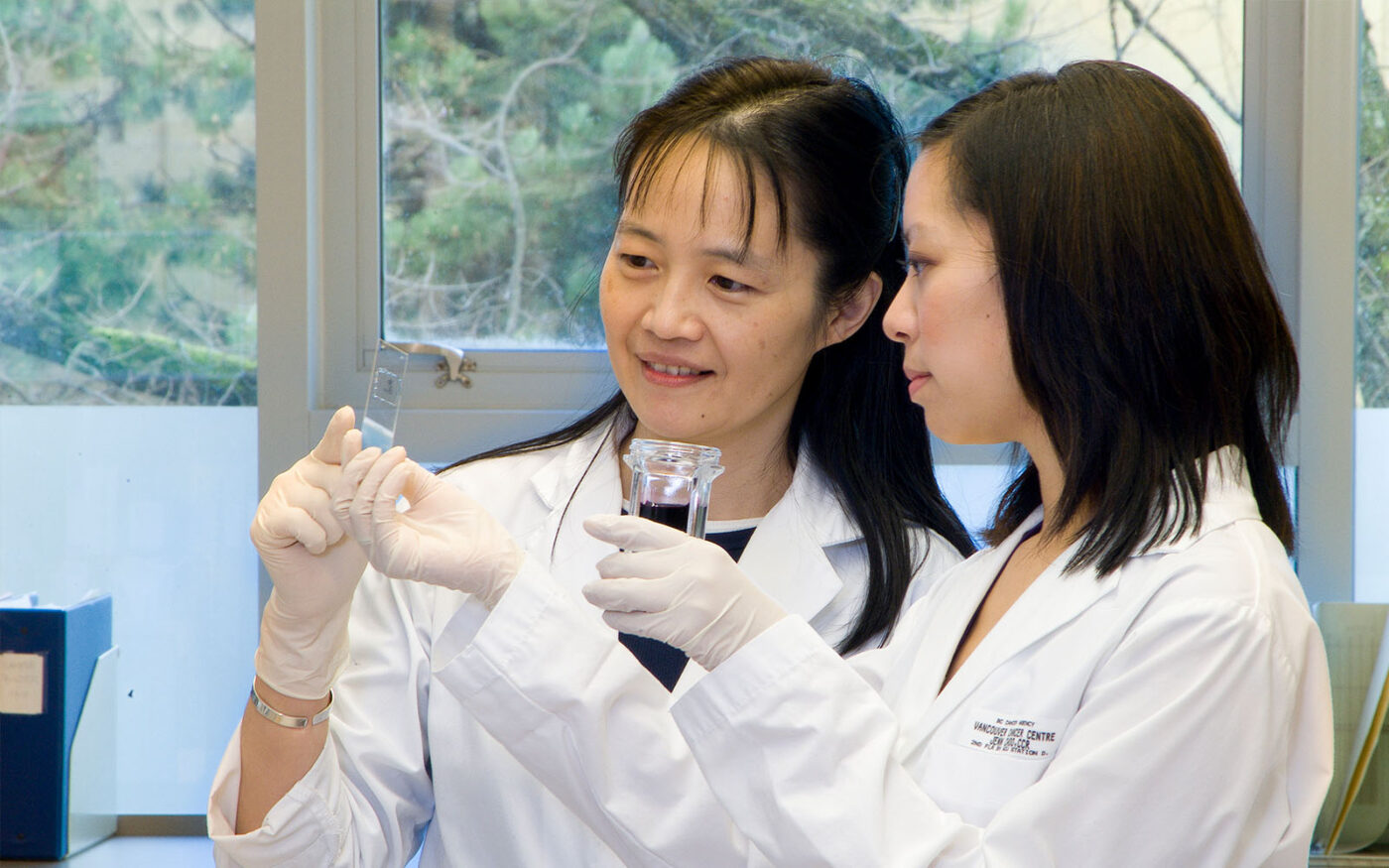
Oral Cancer
Support BC Cancer’s World-Leading Oral Cancer Research
For more information, contact Sandi London, Director. Please consider donating today.
Approximately 1 in 800 British Columbians have a precancerous area in their mouth and about 3,200 Canadians are diagnosed with oral cancer each year. BC Cancer notes that oral cancer is a disease of soft tissue not teeth, so it can also affect anyone even older adults who do not have their natural teeth.
Oral cancer generally has a high mortality rate due to late detection. Late-stage treatment of the disease can also result in disfigurement and affect daily activities such as eating. Oral cancer screening is a highly effective tool for identifying pre-cancerous lesions, and early detection may improve prognosis.
B.C. Oral Cancer Prevention Program
Dentists are trained to recognize and diagnose suspicious lesions. In 2008, the British Columbia Oral Cancer Prevention Program (BC OCPP) partnered with the College of Dental Surgeons of B.C. to refine provincial screening guidelines and referral pathways that had been somewhat disconnected in the past. Led by Dr. Miriam Rosin, BC OCPP is committed to reducing the incidence of oral cancer through the development of new techniques for early detection and treatment. For more than a decade, the BC OCPP team has followed hundreds of patients with oral cancer and oral premalignant lesions (OPLs). One of the team’s most significant discoveries was the identification of molecular markers associated with the progression of OPL to cancer.
Expanding Care Across the Fraser Valley
For many undergoing treatment, dental problems emerge that must be addressed by an oral oncology expert.
Currently, 40% of patients seen by BC Cancer – Surrey’s oral oncology team come from the eastern Fraser Valley.
We know that long-distance travel takes a significant emotional and physical toll, yet many cancer patients make the journey to access these vital services. As a result, BC Cancer – Surrey’s oral oncology service is rapidly reaching capacity.
Building a dental clinic at BC Cancer – Abbotsford will provide:
- higher quality care
- care closer to home
- integrated oral cancer care
Bringing oral oncology services “in house” to the BC Cancer – Abbotsford centre will have a significant impact on patients across the Fraser Valley.
“If it wasn’t for the advances, support, encouragement and sheer stubbornness on my part, I wouldn’t be here,” says survivor Rosalyn Salanguit.
Prevention and Screening Community Clinics
In 2015/2016, BC OCPP launched two successfully community screening clinics in Vancouver and Surrey with an aim was to provide education, research and clinical service for patients and health professionals. Hundreds of people were screened at the clinics, with some being identified at high risk of having oral cancer, and a small number of patients diagnosed with high-grade cases that were referred for treatment.
BC Cancer clinician scientist Dr. Catherine Poh and her team’s primary areas of focus are the management of oral lesions and the use of specialized tools for cancer screening and early detection. Dr. Poh is developing markers to help health-care professionals better triage patients for oral cancer treatment and care, with two projects underway.
The first project involves improved screening tools. Much like a pap test collects cells to test for abnormalities on the cervix (a procedure that has dramatically reduced the incidence of cervical cancer in B.C.), brushing, collecting and testing cells from inside the mouth is an effective way to diagnose oral cancer and pre-cancer. Dr. Calum MacAulay, head of integrative oncology at BC Cancer, has developed an algorithm that captures the features of oral cancer on a smear and provides a score for the lesion. The goal of this project is to provide easy-to-use brushing kits to community dentists. Once the cells have been collected, these kits could be sent to BC Cancer for analysis to help determine if a patient needs to be seen by an oral oncologist.
The second project involves streamlining date collection. Community dentists have sent oral biopsies to the BC Oral Biopsy Service (OBS) for diagnosis for 35 years. The creation of a new online platform has dramatically improved the quality of data received by BC OBS, and that information will be linked to the provincial cancer registry. Dr. Poh’s team is also creating a digital database from the hard-copy OBS records in use prior to 1994 to build a risk-prediction model for oral lesions.
By tracking pre-malignant lesions and linking them to the BC Cancer registry database researchers will gain valuable information for new initiatives on how to predict the transformation of pre-malignant lesions to oral cancer with the hope of preventing it.
Promising New Approaches to Treatment
Two additional promising projects look to the future of oral cancer treatment and care.
Dr. Catherine Poh and her colleagues are also working in the field of genetic testing. They have created a digital PCR platform with markers to detect common genetic changes associated with oral cancer to help assess the risk and chances of recurrence. Digital PCR (polymerase chain reaction) is a technique used to replicate DNA for analysis. While traditional PCR carries out one reaction per sample, digital PCR separates the sample into thousands of distinct measurements, making it a more reliable, sensitive method.
Another project Dr. Poh and her team are working on involves topical cryotherapy, which has been shown to be a promising solution for low-risk patients. (Topical cryotherapy generally involves using liquid nitrogen on a lesion to freeze and kill cells.)
Topical photodynamic therapy is also being developed for oral pre-cancerous lesions and has shown good results for at-risk oral pre-cancers, especially for younger patients. Photodynamic therapy involves the use of a special light to reach cancer or pre-cancerous cells.
Additional research and follow-up will help scientists determine if this is a feasible surgical alternative.
Support BC Cancer’s World-Leading Oral Cancer Research
For more information, contact Sandi London, Director. Please consider donating today.